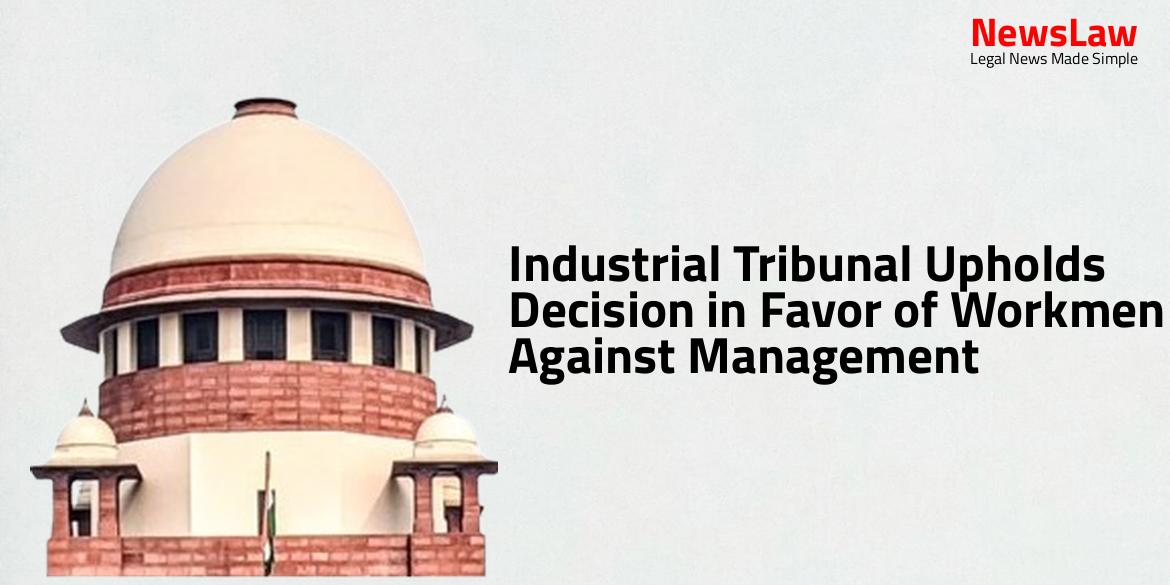In a significant legal case, the Industrial Tribunal’s decision favoring the workmen against the management has been upheld by the Delhi High Court. This ruling addresses the dispute surrounding designation and wages, highlighting the importance of fair labor practices and worker entitlements. The Tribunal’s judgment stands as a testament to the protection of workmen’s rights in the industrial sector, setting a precedent for future workplace disputes.
Facts
- Industrial Tribunal passed the award in favor of the workmen against the management.
- The dispute was regarding the designation of workers and minimum wages as per their category.
- The management was obligated to clarify the category of workers and pay minimum wages accordingly.
- Allegations were made that the management was not complying with the Factory Act and Minimum Wages Act.
- Management was required to maintain a register with the names and designations of the workmen.
- The Tribunal adjudicated the dispute in favor of the workmen on both issues of espousal and entitlement to designated roles based on the nature of their work.
- The Tribunal rejected the management’s preliminary objection regarding the workmen being engaged as laborers, considering the complexity of the factory’s operations and the evidence provided by the workmen.
- Designations were determined to align with the tasks performed and not be arbitrarily assigned by the management.
- Lists of unskilled workers from previous cases were presented but deemed to have limited relevance to the current dispute as they primarily concerned transfers rather than job designations.
- The Tribunal awarded that the designations be assigned to the workmen as claimed, except for those who had settled their claims previously.
- The objection regarding espousal raised by the management was dismissed as lacking substance.
- The Tribunal emphasized that workmen should be designated based on their actual duties.
- Based on the evidence presented, the discrepancy between the workmen’s actual roles and the management’s assertions was highlighted.
- The workmen were entitled to the designations claimed by them, as concluded by the Tribunal.
- The specialized nature of the workmen’s jobs and the importance of appropriate designations were noted in the Tribunal’s final decision.
Issue
- The dispute before the learned Tribunal revolved around the entitlement of workmen to wages as per the designations mentioned in Annexure-A.
- The terms of reference provided to the Tribunal specifically asked whether the workmen listed in Annexure-A are entitled to wages based on the designations mentioned against their names.
- The crux of the issue was whether the designation of the workmen was rightly decided by the Tribunal.
- The Tribunal’s award would determine the relief and directions necessary in relation to the entitlement of the workmen to wages as per their designated roles.
Arguments
- Petitioner management contends that the Industrial Tribunal erroneously assumed that the workmen were working on machines run on electricity, without proper evidence.
- The Tribunal ignored the fact that out of 378 workers, only 52 appeared in the witness box, and only 51 gave affidavits, on which the award was based.
- The management asserts that the workmen were laborers as per their appointment letters and never worked as skilled workers.
- The Industrial Tribunal failed to consider the appointment letters and wage slips of the workers, which designated them as laborers paid for unskilled work.
- The Tribunal concluded that the workmen were performing skilled/semi-skilled work based solely on some affidavits, without considering cross-examinations or other documents.
- The Tribunal wrongly held that the management concealed the truth and that the workmen’s claim was justified, without sufficient documentary evidence.
- The management argued that the Tribunal improperly put the burden on them to prove the workmen were not entitled to their claimed designations.
- The Tribunal disregarded testimonies of the factory head on the nature of work and machines involved, indicating a mix of skilled and unskilled tasks.
- The Tribunal’s conclusion that workmen were performing specialized jobs and deserving of designated roles was seen as unjustified.
- The Tribunal failed to acknowledge that the workmen did not provide any documentation to prove they were working as skilled workers.
- The management criticized the Tribunal for not seeking clarity on the roles of operators/supervisors from the factory head, who stated that work was unskilled.
- The discrepancies in the workmen’s affidavits and cross-examinations regarding job titles and manual work were not appropriately addressed by the Tribunal.
- The respondent union argues that the dispute raised before the Industrial Tribunal was validly espoused, contrary to petitioner’s claim.
- The workmen performed specialized jobs, justifying their demand for designation based on their actual responsibilities and skills.
- Evidence from a witness supported the workmen’s claims for designations according to their job performed.
- The industrial dispute was argued to be a general dispute of the entire group of workmen, not requiring individual affidavits from each workman.
- The majority of workmen were not members of the union, but the claim for designation was deemed legal and justified.
- The jobs listed in Annexure – A were argued to be non-existent with the management, supporting the workmen’s demand for designated roles.
- The Tribunal noted that the burden of proving proper espousal was on the workmen, but due to a substantial number of workmen in the group, individual espousal was not necessary.
- Evidence indicated that the workmen were performing skilled or semi-skilled jobs, not unskilled as claimed by the management, justifying their demand for designation.
- The Tribunal ruled that workmen be given designations as claimed, except for specific roles like Mali, Fire-men, Loader, or simple helper.
- It was emphasized that the varied nature of work performed by the workmen justified their request for varied designations.
Analysis
- The dispute involves 378 workers collectively advocating for their cause regarding designation and wages.
- The management’s witness provided details about the factory’s operations and workforce composition.
- The burden of proof lies with the workmen to establish proper espousal of the dispute.
- The learned Tribunal clarified that the benefit of designation will be available only to those workmen who have not settled their claim with the management.
- The workmen witnesses consistently supported their claims about performing skilled or semi-skilled jobs.
- The High Court’s jurisdiction under Article 226 of the Constitution is limited to correcting errors of jurisdiction and not acting as an appellate court.
- The learned Tribunal’s findings were held to be justified and legal based on the evidence presented.
- The Tribunal rightly considered the issue of espousal and granted designation to the workmen as claimed in Annexure A.
- The workmen union effectively represented the collective grievances of a substantial group, indicating proper espousal.
- The management’s plea that some workmen cannot be granted skilled/semi-skilled designation was rejected.
- The designation of workmen should be as per the nature of work performed, with a distinction between skilled, semi-skilled, and unskilled roles.
- Plurality of witnesses to witness’s testimony can be relied upon to inspire the Court’s confidence.
- The condition of an espousal arises only when the dispute is of the nature of an individual dispute concerning a particular workman.
- Classification of an employee must be in the category he is entitled to.
- An ‘outside’ union can be sufficiently representative to espouse a cause without additional support for the dispute.
- It is not necessary for a union to exclusively consist of workmen from a particular establishment to support a dispute.
- Industrial adjudication is pragmatic and does not rely on rigid or inflexible formulas.
- Support of a union in a dispute may be proved through a resolution or other forms of proof.
- Industrial dispute is any dispute connected with the employment, non-employment, or terms of employment of a person.
- Proof of a fact does not necessarily require multiple witnesses; a credible solitary witness can be sufficient.
- Trade union movement aims at encouraging the formation of larger unions for proper representation of workmen.
- The petitioner management failed to prove that the Tribunal acted arbitrarily or contrary to the law
- The Tribunal’s decision was justified based on the evidence presented
- The petitioner had ample opportunities to provide evidence to support their claims
Decision
- The impugned award dated 29 September, 2009 passed by the Industrial Tribunal – I, Karkardooma Courts, Delhi, in industrial dispute ID No 57/2000 is upheld.
- The petition in question is dismissed.
- The decision is in favor of the workmen and against the management.
- Appropriate Government will be informed about the decision.
- The judgment will be uploaded on the website immediately.
Case Title: SAWHNEY RUBBER INDUSTRIES Vs. WORKMEN (2024:DHC:4567)
Case Number: W.P.(C)-3014/2010



